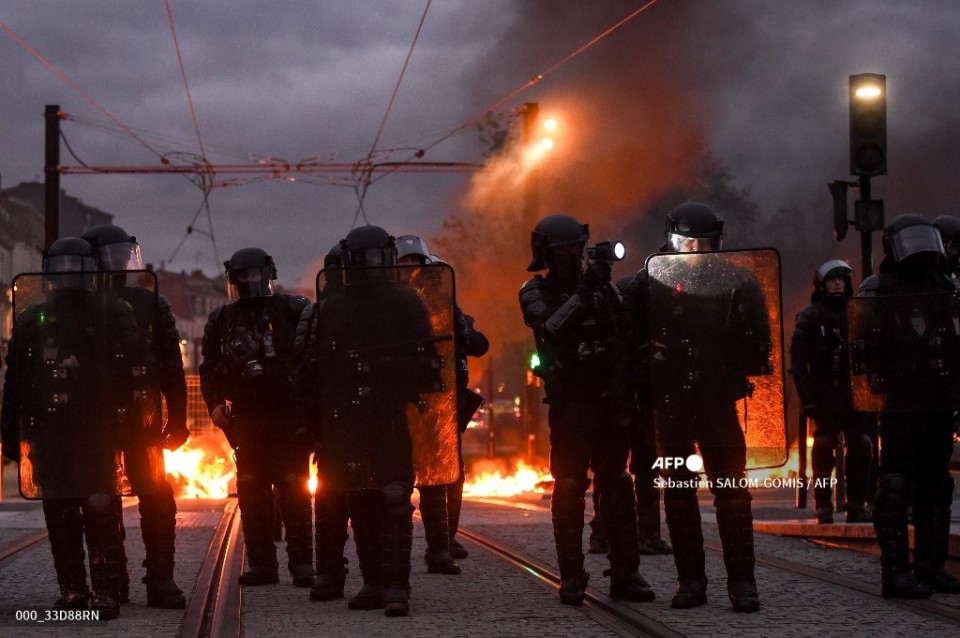

Paris, France | AFP | Saturday 4/15/2023
by Baptiste PACE and Stuart WILLIAMS
French President Emmanuel Macron signed his controversial pension reform into law Saturday, defying three months of protests and pleas from unions not to implement the legislation.
The alterations became law after the text was published before dawn in France’s official journal, prompting accusations from the opposition Macron was seeking to smuggle it through in the depth of the night.
The publication came just hours after the approval on Friday by the Constitutional Council of the essence of the legislation, including the headline change of raising the retirement age from 62 to 64.
Unions warned they were calling for mass Labour Day protests on May 1, and sometimes violent demonstrations erupted in several cities overnight after the verdict was announced.
The battle to implement the law turned into the biggest domestic challenge of Macron’s second mandate, as he faced widespread popular opposition to the changes but also sliding personal popularity.
Socialist leader Olivier Faure said that Macron’s swift signing of the law showed “disdain” towards the protest movement while hard-left MP Francois Ruffin called it a “democratic hold-up”.
“A law enacted in the middle of the night, like thieves,” tweeted French Communist Party chief Fabien Roussel. “Everyone on the street May 1.”
– ‘Not defeated’ –
The nine-member Constitutional Council ruled in favour of key provisions of the reform, including raising the retirement age to 64 and extending the years of work required for a full pension, saying the legislation was in accordance with French law.
Six minor proposals were rejected, including forcing large companies to publish how many over-55s they employ, and the creation of a special contract for older workers.
The appearance of the text in France’s Official Journal — the gazette of record — means it has now been enacted into law.
“The Social Security Code is thus amended. In the first paragraph, the word: ‘sixty-two; is replaced by the word: ‘sixty-four’,” states the text, referring to the retirement age.
But the constitutional court’s decision could prove a shallow victory for Macron, as analysts say it has come at a major personal cost for the 45-year-old.
The president’s approval ratings are near their lowest levels ever, and many voters have been outraged by his decision to ram the pensions law through parliament without a vote, using a legal but controversial mechanism denounced by opponents as anti-democratic.
Polls consistently show that two out of three French people are against working a further two years.
Macron has called the change “necessary” to avoid annual pension deficits forecast to hit 13.5 billion euros ($14.8 billion) by 2030, according to government figures.
“Stay the course. That’s my motto,” Macron said Friday as he inspected Notre Dame Cathedral in Paris, four years after a devastating fire nearly destroyed the gothic monument.
Seeking to avoid triumphalism, Prime Minister Elisabeth Borne tweeted that after the court verdict “there are no winners or losers”.
But the left-wing Liberation daily said in its headline above a picture of a protest: “Not defeated: opponents of the reform are not going to disarm”.
Bikes, e-scooters and garbage were set on fire in the capital overnight while protests rallying hundreds erupted in other cities, including Marseille and Toulouse.
In the western city of Rennes, protesters set fire to the entrance of a police station and a conference centre. Paris police said 112 people had been arrested as of 10:30 pm (2030 GMT).
– ‘Tidal wave’ on May 1 –
Macron, who has made only the most infrequent public comments on the crisis, is expected to address the French early next week, a presidential source told AFP.
It remains to be seen if the months-long effort by trade unions to block the changes will continue after three months of strikes and protests.
Unions issued a joint statement urging Macron not to sign the legislation into law, saying the issue was “not finished”.
The general secretary of the CGT union, Sophie Binet, called for a “popular and historic tidal wave” of people on the streets to oppose the reforms on May 1.
Unions rejected an offer by Macron for talks on Tuesday, saying they would only meet after May 1.
Last month, a strike by Paris garbage workers left the capital strewn with 10,000 tonnes of uncollected rubbish.
In a second decision on Friday, the court rejected a bid from opposition lawmakers to force a referendum on an alternative pension law that would have kept the retirement age at 62.
France lags behind most of its European neighbours, many of which have hiked the retirement age to 65 or above.
Opponents of the changes say they penalise women and unskilled workers who started their careers early and undercut the right to a long retirement.
© Agence France-Presse

